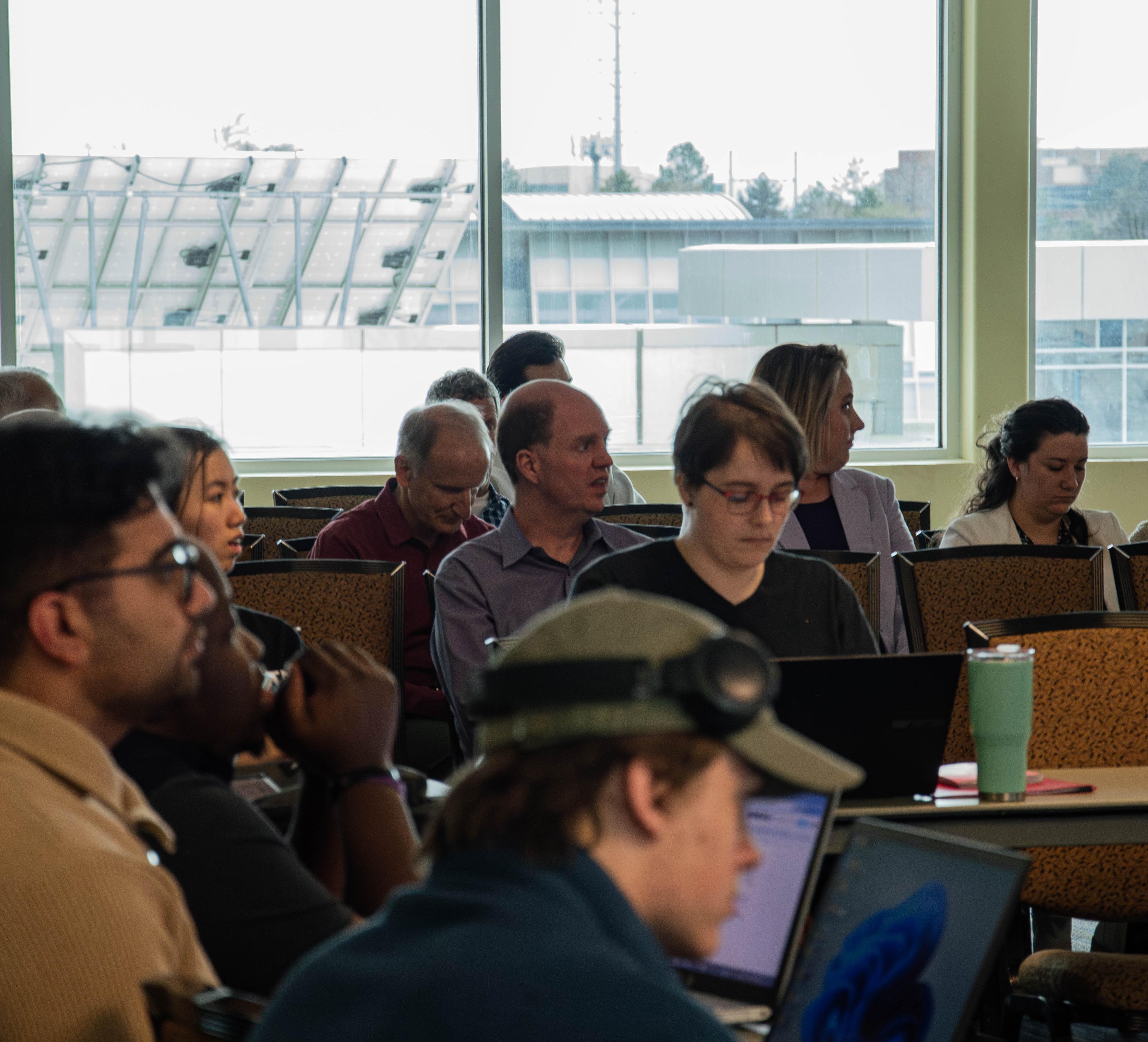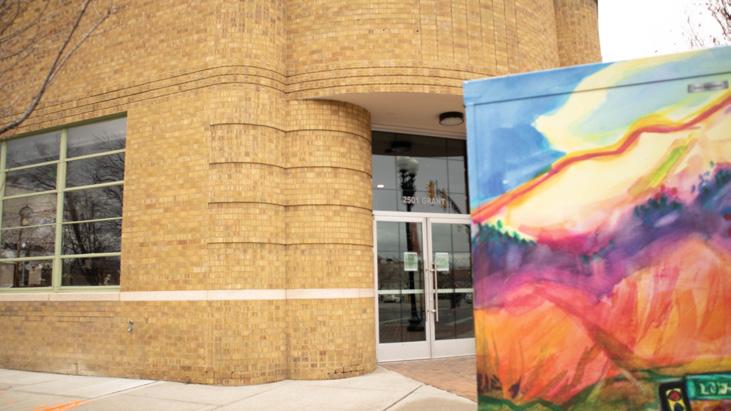



Thursday | February 29, 2024 | Volume 98 | Issue 14 Cover Photo By: Norlito Ranchez Jr. | The Signpost
COFFEE, CHEESE, CHEERS! THE MERCANTILE JOINS OGDEN’S 25TH STREET
|
WSU BASKETBALL SEASON COMING TO A CLOSE Robert Casey Weber State Athletics AJ Handley | The Signpost
Culture | Pg. 6 Sports WSU SET TO FACE TUITION INCREASES
Pg. 9
By BRISA ODENTHAL Section Editor
1.
Which senator will step down from their seat as Senate Majority Leader in November?
A. Bernie Sanders
B. Mitt Romney
C. Sarah Palin
D. Mitch McConnell
Which two branches of professional sports are talking about making their entrance into the Salt Lake City market?
A. NFL and NHL
B. NHL and MLB
C. MLB and NFL
D. UFC and NFL

Which school received a $1 billion donation, making medical school free for all students?
A. Albert Einstein College of Medicine
B. The Johns Hopkins University aaSchool of Medicine
C. Icahn School of Medicine at Mount Sinai
D. Mayo Clinic Alix School of Medicine
Which U.S. state is currently facing their second-largest wildfire in the state’s history?
A. California
B. Arizona
C. Texas
D. New Mexico

2 | NEWS | thesignpostwsu.com | February 29, 2024
KNOW YOUR NEWS? ANSWERS AND EXPLANATIONS ON PAGE 11
DO YOU
2. 3. 4.
Money MANAGEMENT CENTER Make an appointment Did you know? You can get free financial coaching at WSU Davis! weber.edu/moneymanagement NONTRADITIONAL STUDENT CENTER HOURLY child care where children discover, explore & grow Need child care while you are in class or partaking in academic events? Get low-cost hourly child care for children 2-9 years old. Find more information and apply at: weber.edu/nontrad/childcare.html
 By BRISA ODENTHAL Section Editor
By BRISA ODENTHAL Section Editor
Throughout its time as an institute of higher education, Weber State University has branded itself as an affordable option for higher education. With average in-state tuition being around $6,391 and being one of the best schools for return investment in the country, WSU’s tuition costs are a selling point for the university.
However, on Feb. 26 WSU held a meeting titled “Truth in Tuition” regarding the possibility of tuition rising at the university. This comes after the Utah state legislature allocated only $20 million to public universities in the state instead of the originally proposed $35 million. With this decrease in funding for the year, that leaves $834,000 in funding for WSU, which begins July 1.
WSU administration, including Jessica Oyler, the vice president of Student Access and Success, and Ravi Krovi, provost & senior vice president of Academic Affairs, were leading the meeting to show WSU’s perspective on the situation.
With student retention and population growing steadily over the past few years, the

decrease in state money allocated to the university comes at a time when money is needed now more than ever at the university. Because of this, WSU will likely have to increase tuition costs to make up for the discrepancy in funding.
Krovi and Oyler told attendees of the meeting that the percentage raise will likely be around 2%, or about $110 per year for the first increase. The university plans to increase this to a 3.5%, or about $192 per year.
Currently, 70% of WSU students are receiving some sort of financial aid from the university, with the average aid amount being just over $5,000 per student.
WSU has not announced specific or certain tuition raises but students should check their eWeber portal for tuition increases for the following semester.
Weber State University has resources and scholarships available for students who may not be able to afford this increase in price, including the WSU Specialized Scholarship form and the Financial Aid office.
Share


February 29, 2024 | thesignpostwsu.com | NEWS | 3 Visit our esports lab! Want to play video games solo or with other students? All students are welcome to visit, play, and relax at the esports computer labs! We have all the gear you need and a spectacular area for those who want to watch! @WeberEsports Learn More @ weber.edu/esports
Brad Mortenson discusses the possible changes regarding student tuition for next year.
this story at thesignpostwsu.com
NORLITO RANCHEZ JR. The Signpost
WSU INSTRUCTOR LEADS BLACK HISTORY MONTH LECTURE: AFRICA AFTER WWII
By REAGAN WHITING Reporter
By ADAM MONTGOMERY Editor at Large
A special lecture series conducted by Weber State University criminology instructor Jean Kapenda came to a close on Feb. 22. This lecture series focused on African history from pre-World War II until the present. This final installment of the lecture series was specifically focused around what occurred in Africa after World War II ended.
Before WWII, many of the countries in Africa were under the control of France, Britain and other European countries. It wasn’t until 1941 that decisions were made regarding what would happen to those African countries after WWII ended.
In August 1941, President Franklin D. Roosevelt and British Prime Minister Winston S. Churchill met aboard the U.S.S. Augusta and drafted the Atlantic Charter.
The Atlantic Charter created the guiding principles for African countries to follow while deciding on their respective forms of government. In his lecture, Kapenda highlighted three clauses in particular: the third, fourth and sixth clauses.
Clause three outlines “the right of all peoples to choose the form of government under which they will live,” and clause six states a desire to “see established a peace which will afford to all nations the means of dwelling in safety within their own boundaries.” While clause four requires African nations to create
larger trade boundaries.
Following the creation of the Atlantic Charter, the Brazzaville Conference of 1944 was held under the authority of Charles de Gaulle. The goal of this conference was to bring the French colonies in Africa under de Gaulle’s control.
According to Kapenda, they also aimed to abolish forced labor, decentralize certain powers and elect local advisory assemblies.
Though the War didn’t end until 1945, the Atlantic Charter played a very important role in reconstructing once peace was agreed upon. Towards the end of WWII, the U.S. began making independence movements around the world.
“The U.S. wanted to decolonize territories in Africa and other places in the world,” Kapenda said.
They were joined by the Soviet Union and China, which proved to be a prelude to the Cold War.
The Cold War began in 1947, lasted until 1991 and brought with it many changes.
“African countries were born in a context where the world was divided into two blocks,” Kapenda said.
Political ideologies were split between the Eastern Bloc and Western Bloc, Africa became very divided and the U.S. created new policies to try and contain communism while also supporting their European allies. This also resulted in many proxy confrontations between the U.S. and Soviet Union.
After the Cold War ended on Dec. 25, 1991, changes in the African governments became more apparent.
According to Kapenda, there were four main


effects. The U.S. became progressively more disengaged in African affairs, Africans began demanding for more democracy and political pluralism, China became a primary trading partner for Africa and the U.S. passed the African Growth and Opportunities Act in 2000. Since then, African populations have been booming, providing a silver lining for them.
“The best market is in Africa,” Kapenda said. “Because they have more young people.”
Kapenda plans to repeat this lecture series soon. Keep an eye out for more information.
“History is crucial to understanding the present,” Kapenda said.


4 | CULTURE | thesignpostwsu.com | February 29, 2024
Computer Science Computer Engineering Data Science Electrical Engineering Systems Engineering (Online)
MASTER OF SCIENCE
WEBER STATE UNIVERSITY Share this story at thesignpostwsu.com
Weber State University criminology instructor Jean Kapenda held the Black Lecture series that discussed African history after the events of World War II.
INSTRUCTOR DE WSU DIRIGE UNA LECCIÓN SOBRE EL MES DE HISTORIA NEGRA: ÁFRICA DESPUÉS
POR MARIA MANTILLA Traductor
POR REAGAN WHITING Reporter
El 22 de febrero se clausuró un ciclo especial de clases dirigidas por Jean Kapenda, profesor de criminología de la Universidad Weber State. Esta serie de conferencias se centró en la historia de África desde antes de la Segunda Guerra Mundial hasta la actualidad. Esta última sesión de la serie de charlas se centró específicamente en lo que ocurrió en África tras el final de la Segunda Guerra Mundial.
Antes de la Segunda Guerra Mundial, muchos de los países africanos estaban bajo el control de Francia, Gran Bretaña y otros países europeos. No fue hasta 1941 cuando se tomaron decisiones sobre lo que ocurriría con esos países africanos una vez finalizada la Segunda Guerra Mundial.
En agosto de 1941, el Presidente Franklin D. Roosevelt y el Primer Ministro británico Winston S. Churchill se reunieron a bordo
del U.S.S. Augusta y redactaron la Carta del Atlántico.
La Carta del Atlántico creó los principios de guía que debían seguir los países africanos a la hora de decidir sus respectivas formas de gobierno. En su conferencia, Kapenda destacó tres cláusulas en particular: la tercera, la cuarta y la sexta.
La tercera destaca “el derecho de todos los pueblos a elegir la forma de gobierno bajo la cual quieren vivir”, y la sexta declara el deseo de “ver establecida una paz que proporcione a todas las naciones los medios de vivir con seguridad dentro de sus propias fronteras”. Mientras que la cuarta cláusula exige a las naciones africanas la creación de fronteras comerciales más amplias.
Tras la creación de la Carta del Atlántico, se celebró la Conferencia de Brazzaville de 1944 bajo la autoridad de Charles de Gaulle. El objetivo de esta conferencia era poner a las colonias francesas de África bajo el control de de Gaulle.
Según Kapenda, también se pretendía acabar con los trabajos forzados, descentralizar

ciertos poderes y elegir asambleas asesoras locales.
Aunque la guerra no terminó hasta 1945, la Carta del Atlántico influyó mucho en la reconstrucción una vez acordada la paz. Hacia el final de la Segunda Guerra Mundial, Estados Unidos comenzó a realizar movimientos independentistas en todo el mundo.
“Estados Unidos quería descolonizar territorios en África y otros lugares del mundo”, explicó Kapenda.
A ellos se unieron la Unión Soviética y China, lo que resultó ser el preludio de la Guerra Fría.
La Guerra Fría comenzó en 1947, duró hasta 1991 y trajo consigo muchos cambios.
“Los países africanos nacieron en un contexto en el que el mundo estaba dividido en dos bloques”, señaló Kapenda.
Las ideologías políticas se dividieron entre el Bloque del Este y el Bloque del Oeste, África quedó muy dividida y Estados Unidos creó nuevas políticas para intentar contener el comunismo, a la vez que apoyaba a sus aliados europeos. Esto también dio lugar a muchos
enfrentamientos por poderes entre Estados Unidos y la Unión Soviética.
Tras el final de la Guerra Fría, el 25 de diciembre de 1991, los cambios en los gobiernos africanos se hicieron más evidentes.
Según Kapenda, hubo cuatro consecuencias principales. Estados Unidos se fue apartando progresivamente de los asuntos africanos, los africanos empezaron a exigir más democracia y pluralismo político, China se convirtió en el socio comercial principal de África y Estados Unidos aprobó la Ley de Crecimiento y Oportunidades para África en 2000. Desde entonces, la población africana está en crecimiento, lo cual les brinda esperanza.
“El mejor mercado está en África”, afirma Kapenda. “Porque tienen más gente joven”.
Kapenda tiene previsto repetir esta serie de conferencias próximamente. Manténgase atento para más información.
“La historia es crucial para entender el presente”, dijo Kapenda.


February 29, 2024 | thesignpostwsu.com | CULTURE | 5
By JACEY ROE Reporter
DEEPENING OGDEN’S SENSE OF COMMUNITY
By ADAM MONTGOMERY Editor at Large
Ogden’s 25th Street will get a delicious makeover as Beehive Cheese, Kaffe Mercantile and Roosters Brewing Company come together to open The Mercantile, a restaurant and bar for coffee enthusiasts, wine connoisseurs and foodies alike.
The Mercantile is located in the historic Union Bus Depot building, which was originally constructed in the 1940s. It was used as the Greyhound station until the 1990s and the space has been carefully restored and decorated for The Mercantile.
The building was even gifted a real vintage Greyhound bus seat that has been reupholstered and placed in the eatery for use.
The building was purchased in 2021, after sitting empty for several years, to become payroll offices and other company spaces, but the company collectively decided to build something unique out of the depot. Kym Buttschardt, the co-owner of Roosters Brewing Co., recognized that Ogden needs more places to come together.
“Knowing that 25th Street needs life and not just office spaces, we wanted to make something really cool out of the front of this building,” Buttschardt said. “We knew immediately who we wanted to ask to join us in making something super special down here.”
The decision to open the cafe was a deliberate one for Roosters Brewing Co. The company purchased the depot with the intention of deepening its roots in the Ogden community and how that positively impacts these companies.
The sale of the building became final just in time for Valentine’s Day weekend.
“It just felt right that we’d close on Valentine’s weekend, since our whole plan was to dig even deeper into our love for Ogden and what that means for our company,” said Buttschardt.
The eatery is not just a cafe full of pastries and coffee; it also offers beverages for wine and beer enthusiasts. Sprawled out among
the many seats are table games such as tictac-toe. This offers the business the opportunity to host pairing events and cheese-centric educational events, making the location an exciting addition to Ogden’s culinary scene.
The Mercantile’s menu offers local flavors and ingredients that make Ogden’s culinary scene unique. The cafe’s menu includes a variety of breakfast and lunch options from biscuits and gravy to a reuben on rye, as well as a selection of wine and beer to complement the cheese boards.
The mixed use eatery hosts a full espresso bar, offering a range of classic cafe options, including the Kaffe Egg Sandwich, scrambles, turnovers and scones.
However, what sets The Mercantile apart is its lunch and late-night menu, featuring salads, sandwiches and cheese boards that show Beehive Cheese’s award-winning cheddars and Roosters Brewing Co.’s culinary and local beer expertise.
“Our motto is ‘making friends with cheese,’ and The Mercantile project is the brainchild of the great friends we have made through our adventures in cheese,” Britton Welsh, president of Beehive Cheese, said.
The combined owners are excited to be part of the Ogden community and are committed to creating a welcoming and exciting space
for all.
“We want The Mercantile to be a place where everyone feels welcome,” Buttschardt said. “Whether you’re a local or just passing through, we hope you’ll stop by and say hello.”
Just as excited to open up and share new culinary experiences with the Ogden community, the co-owner of Kaffe Mercantile and partner, Lance Smith, appreciates the opportunity to be included.
Kaffe Mercantile is a self-described neighborhood coffee shop with two locations, one in Ogden and the other in South Ogden, creating craft coffee and serving an array of pastries.
“We just feel like we’re the kids that got picked for the team,” Smith said. “We’re so excited to be in with the cool kids. We just love Beehive and Roosters so much, it’s an honor to get to do this all together.”
The Mercantile is a place where people can come together, whether it’s for a coffee, a work session or a glass of wine and a cheese board. During the month of February, The Mercantile had soft open hours. Starting in March it will be open seven days a week. More information can be found on The Mercantile’s instagram page @themercantile_on25th.


6 | CULTURE | thesignpostwsu.com | February 29, 2024
The Mercantile Market and Eatery on the corner of 25th Street.
AJ HANDLEY The Signpost





February 29, 2024 | thesignpostwsu.com | CULTURE | 7 Get Academic Help Find free academic resources: weber.edu/studentlife
Top: The building of the new Mercantile Market and Eatery also houses the offices of the Roosters Hospitality Group. Right: Business hours are posted on the front doors of the new Mercantile Market and Eatery.
AJ HANDLEY The Signpost
AJ HANDLEY
The Signpost








thesignpostwsu.com | February 29, 2024

 By JACOBA JONES Asst. Section Editor
By COLLYN COWLES Section Editor
By JACOBA JONES Asst. Section Editor
By COLLYN COWLES Section Editor
Women’s Basketball:
Weber State University’s women’s team, currently standing at 7–21 overall and 4–11 in the Big Sky Conference, is vying for a stronger finish as they occupy the eighth spot in the conference standings.
Their recent clash against Idaho State University on Feb. 24 resulted in a 57–72 loss, despite a spirited effort.
Even though the Wildcats faced an uphill battle against a determined Idaho State squad, Kendra Parra showcased her offensive dominance with 19 points, including five suc-
cessful 3-pointers, and Jadyn Matthew contributed 12 points alongside six rebounds. The Bengals, led by Halle Wright’s impressive 20-point performance, managed to maintain control after securing an early lead.
As the regular season nears its end, the Wildcats are gearing up for their final road trip. They are set to face Northern Colorado University in Greeley, Colorado, on Feb. 29, followed by a matchup against the University of Northern Arizona in Flagstaff on March 2. The team will conclude their home games with a fixture against Montana State University on March 4 before setting their sights on the Big Sky Tournament.
Men’s Basketball:
On the men’s front, the Wildcats are embroiled in a pivotal stretch as they continue to
have success in the Big Sky Conference. With an overall record of 18–10 and a conference standing of 9–6, the Wildcats, currently sitting in the fourth spot, are determined to make a statement.
In a showdown against Northern Colorado, scheduled for Feb. 29 at the Dee Events Center in Ogden, Weber State aims to capitalize on home advantage. Led by standout player Dillon Jones, who boasts an impressive 16 double doubles this season, the Wildcats are primed for an exhilarating matchup.
Jones leads the team in points, rebounds, assists and steals, showcasing his multifaceted skill set. His exceptional performance has solidified his position as a key player in the Big Sky Conference and beyond.
With the support of seasoned players like KJ Cunningham, who recently etched his
name in Weber State history by playing his 135th career game, the Wildcats are poised for success in their remaining fixtures.
As they prepare to honor their seniors in the upcoming home game against Northern Arizona on March 2, followed by a clash against Montana State on March 4, Weber State is determined to leave an indelible mark in the Big Sky Tournament.
As the regular season draws to a close, both the men’s and women’s basketball teams at Weber are prepared to unleash their full potential, as they get ready for the Big Sky basketball tournament from March 9-14.
Share this story at thesignpostwsu.com
February 29, 2024 | thesignpostwsu.com | SPORTS | 9
Weber State Women’s Basketball Guard and Forward position, Laura Taylor (0), going for a basketball as an opposing team member attempts to block.
Blaise Threatt making a shot for Weber State.
SARA STAKER The Signpost
ROBERT CASEY Weber State Athletics



































,, DECIDE TO LEAD. ©2023 U.S. ARMY. PAID FOR BY THE U.S. ARMY. WE GIVE YOU THE SKILLS. YOU DECIDE WHERE THEY TAKE YOU. Make the most of your potential with training, tools, and mentorship. Develop your skill set while pushing your abilities to the next level. For more info about Weber State Army ROTC, contact Clyde Ratliff at (801) 626-8609, or email clyderatliff1@weber.edu. Visit us at weber.edu/rotc. Price per person based on double occupancy plus $299 tax service/gov’t fees. Ask your Travel Consultant for terms & conditions. Add-on airfare with transfers available from most major gateways. Call for details. USE PROMO CODE: YMT2024 1-833-978-0791 12 DAYS: MAY-SEPT 2024 DEPARTURES Starting at $2149 $1899 Grand Alaskan Cruise & Tour
DO YOU KNOW YOUR NEWS?
QUIZ ANSWERS FROM PAGE 2 2. 1. 3. 4.
The answer is D, Mitch McConnell. According to NPR, Republican Senator Mitch McConnell of Kentucky will be stepping down from his position as Senate Majority Leader this year in November.
The answer is B, NHL and MLB. According to KSL, with conversations about a potential NHL or MLB team coming to Salt Lake City running rampant the last few years, the Utah Senate passed SB272 in a 21-7 vote which sets up a reinvestment zone in the city dedicated to entertainment and sports. This will prepare the city for possible arenas for an NHL and/or MLB team.
THE SIGNPOST TEAM
Editor-in-Chief Kennedy Camarena kennedycamarena@mail.weber.edu
Managing Editor
Marianna Lopez-Luritta mlopezluritta@mail.weber.edu
Design & Graphics Editor Star Neil starneil@mail.weber.edu
Design & Graphics Editor Emilie Hart emiliehart@mail.weber.edu
Photo Editor Anna Kuglar briannakuglar@mail.weber.edu
Asst. Photo Editor Norlito Ranchez norlitoranchezjr@mail.weber.edu
Chief Copy Editor Justin Steed justinsteed@mail.weber.edu
News Editor Brisa Odenthal brisaodenthal@mail.weber.edu
Asst. News Editor Gretel Monjar gretelmonjar@mail.weber.edu
Sports Editor Collyn Cowles collyncowles@mail.weber.edu
Asst. Sports Editor Jacoba Jones jacobajones@mail.weber.edu
Editor at Large Adam Montgomery adammontgomery1@mail.weber.edu
The answer is A, Albert Einstein College of Medicine. According to AP News, former professor of the university, Ruth Gottesman and her late husband, a Wall Street investor, donated $1 billion to the university, making the university tuition free.
The answer is C, Texas. According to The Standard, Texas is in the midst of a major wildfire spreading amongst small towns in the state’s panhandle.
Culture Editor Lexie Andrew lexieandrew@mail.weber.edu
Culture Editor Megan Swann meganswann@mail.weber.edu
Translation Editor Nathanael Stout nathanaelstout@mail.weber.edu Advisor Jean Norman jeannorman@weber.edu
Business Manager Rob Steedley robertsteedley@weber.edu

February 29, 2024 | thesignpostwsu.com | NEWS | 11 The Signpost is a student publication, written, edited and drafted by Weber State University students. Student fees fund the printing of this publication. Opinions or positions voiced are not necessarily endorsed by the university. The Signpost reserves the right to edit for reasons of space and libel and to refuse to print any letters. Letters should be submitted online to thesignpost@weber.edu and read letter to the Editor in the subject box. Letters should not exceed 350 words.







 By BRISA ODENTHAL Section Editor
By BRISA ODENTHAL Section Editor























 By JACOBA JONES Asst. Section Editor
By COLLYN COWLES Section Editor
By JACOBA JONES Asst. Section Editor
By COLLYN COWLES Section Editor




































